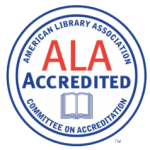Careers & Accreditation – Master of Library and Information Science (MLIS)
 The fully American Library Association (ALA) accredited Master of Library and Information Science (MLIS) program at the University of Maryland (UMD) prepares students for careers in a plethora of fields – including government, higher education, archives, museums, libraries, startups, and many other organizations engaged in information activities.
The fully American Library Association (ALA) accredited Master of Library and Information Science (MLIS) program at the University of Maryland (UMD) prepares students for careers in a plethora of fields – including government, higher education, archives, museums, libraries, startups, and many other organizations engaged in information activities.
Learning Objectives of the MLIS Program
Facts and Figures
According to a survey administered to 2023 graduates, 91% of those who were employed held positions directly relevant to the degree and 92% of these were employed full-time. In 2022, roughly 80% of those who were employed held positions directly relevant to the degree. More information from our 2023 alumni survey through Library Journal is available here (link to: https://www.libraryjournal.com/story/news/challenges-opportunities-placements-and-salaries-2024).
Our average time to degree completion is 2.4 years (based on data from 2024- 2025). Our retention rate after 2 years is 97.55% (Based on our Fall 2023 cohort).
| Academic Year | After 1 Year | After 2 Year | After 3 Year | After 4 Year |
|---|---|---|---|---|
| 2024 | 96.15 | |||
| 2023 | 97.55 | 97.55 | ||
| 2022 | 92 | 87.8 | 88.95 | |
| 2021 | 96.6 | 90.7 | 93.25 | 91.45 |
Average time to degree for LBSC/LBSO Students
| Academic Year | Average Time to Degree | Median Time to Degree |
|---|---|---|
| 2025- 2026 | 2.4 | 2.3 |
| 2024- 2025 | 2.3 | 2.3 |
| 2023- 2024 | 2.45 | 2.1 |
| 2022- 2023 | 2.46 | 2.3 |
| 2021- 2022 | 2.3 | 2 |
Career Paths
Mission Statement of the MLIS program
The MLIS Program educates a diverse group of students in the knowledge, skills, habits of thought and inquiry, a
nd ethics of the library and information professions through theory and practice, enabling them to be leaders in the state, national, and global information society.
Vision Statement of the MLIS program
The Master of Library and Information Science (MLIS) degree at the University of Maryland prepares graduates to be socially engaged and technologically focused information professionals, ready to create, educate, and innovate.